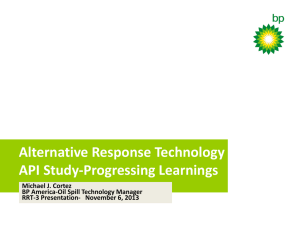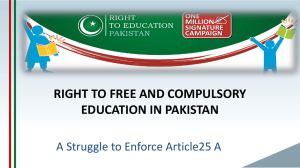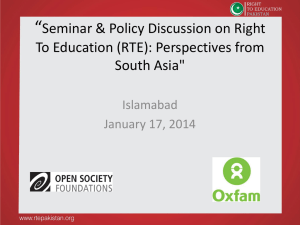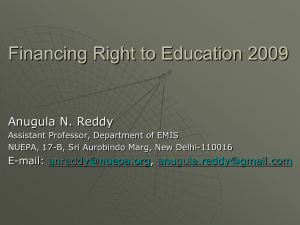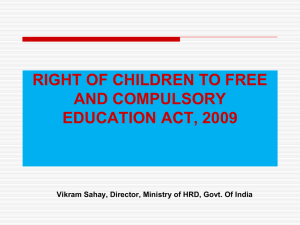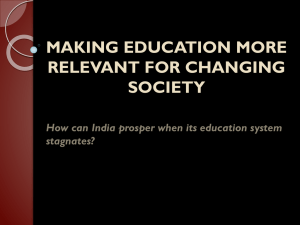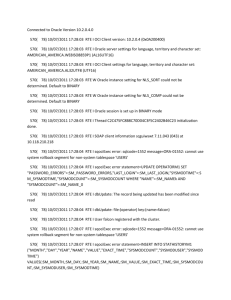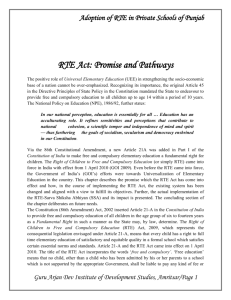Seminar & Policy Discussion on - Annual Status of Education Report
advertisement
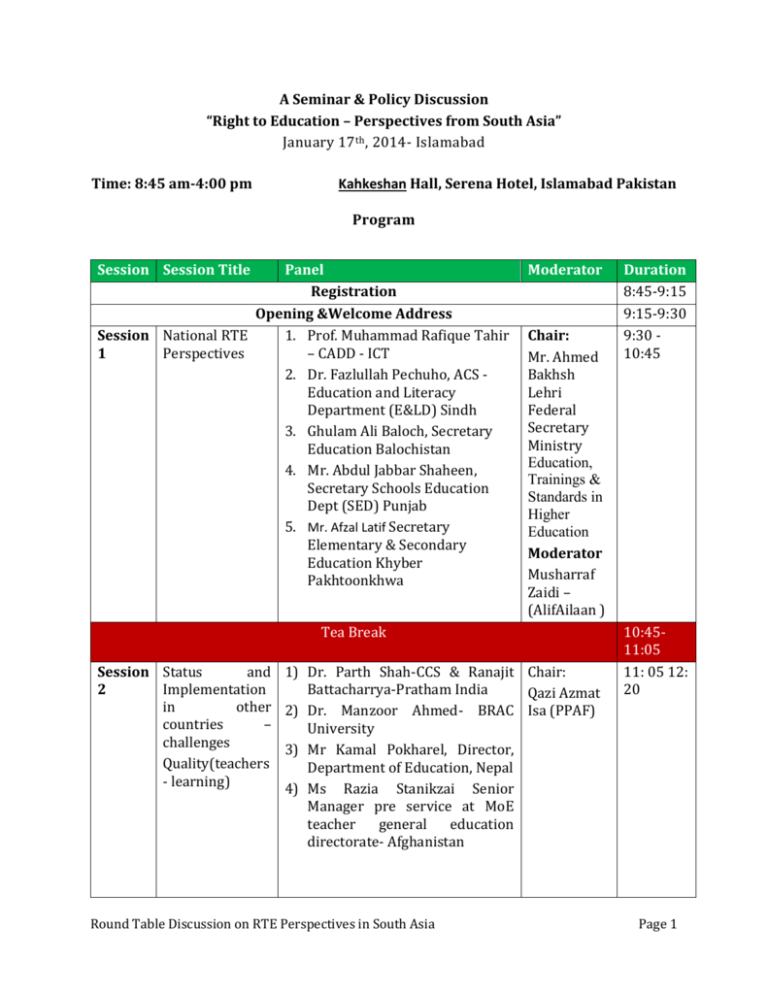
A Seminar & Policy Discussion “Right to Education – Perspectives from South Asia” January 17th, 2014- Islamabad Time: 8:45 am-4:00 pm Kahkeshan Hall, Serena Hotel, Islamabad Pakistan Program Session Session Title Panel Registration Opening &Welcome Address Session National RTE 1. Prof. Muhammad Rafique Tahir 1 Perspectives – CADD - ICT 2. Dr. Fazlullah Pechuho, ACS Education and Literacy Department (E&LD) Sindh 3. Ghulam Ali Baloch, Secretary Education Balochistan 4. Mr. Abdul Jabbar Shaheen, Secretary Schools Education Dept (SED) Punjab 5. Mr. Afzal Latif Secretary Elementary & Secondary Education Khyber Pakhtoonkhwa Moderator Chair: Mr. Ahmed Bakhsh Lehri Federal Secretary Ministry Education, Trainings & Standards in Higher Education Moderator Musharraf Zaidi – (AlifAilaan ) Tea Break Session Status and 2 Implementation in other countries – challenges Quality(teachers - learning) 1) Dr. Parth Shah-CCS & Ranajit Chair: Battacharrya-Pratham India Qazi Azmat 2) Dr. Manzoor Ahmed- BRAC Isa (PPAF) University 3) Mr Kamal Pokharel, Director, Department of Education, Nepal 4) Ms Razia Stanikzai Senior Manager pre service at MoE teacher general education directorate- Afghanistan Round Table Discussion on RTE Perspectives in South Asia Duration 8:45-9:15 9:15-9:30 9:30 10:45 10:4511:05 11: 05 12: 20 Page 1 Session RTE: 1) Dr. Parth Shah – CCS Chair: 3 Partnerships 2) Dr. Manzoor Ahmed – BRAC Moderator and Private University–IED Baela Raza Sector- scope & 3) Dr. Faisal Bari (FOSI) Jamil (ITA) on whose terms Lunch & Prayers 1:30 -2:30 Session A Panel 1) Ms. Sadiqa Salahuddin Moderated 4 Discussion on (Director-Indus Resource by Ms. Zehra RTE: New Centre) Arshad Directions for 2) Ms. Eupharates Gobina (PCE) & South Asia – (UNICEF) Baela Raza informing the 3) Mr. Shakeel Ahmad-UNDP. Jamil (ITA) Post 2015 4) Dr. Kozue Kay Nagata, UNESCO Development 5) Mr Kamal Pokharel, Director, Goals Department of Education, Nepal. 6) Dr. Manzoor Ahmad (BRAC), Bangladesh, 7) Ms. Nargis Sultana (FOSI), 8) Mr. Saeed ul Hasan OXFAM Chief Guest Concluding Remarks :Mr. Baligh ur Rehman, Minister of State for Education, Trainings and Standards in Higher Education 12:20 1:30 2:30 – 3:45 3:45 :4:00 Vote of Thanks Tea Round Table Discussion on RTE Perspectives in South Asia Page 2 Seminar & Policy Discussion “RTE– Perspectives from South Asia” January 17th, 2014- Islamabad Time: 9:00 am-4:00 pm Venue: Kahkeshan Hall, Serena Hotel Islamabad Pakistan. Seminar & Policy Discussion on “RTE- perspectives from South Asia” Introduction Right to education is considered as a universal basic fundamental right of every human being. In many countries this is safeguarded in their constitutions. Every country is, thus, bound by both national and international norms to ensure this basic right of their citizens to quality education. Efforts are being made since many decades to eradicate illiteracy from the globe and since 1990 the efforts have accelerated (Jomtien/Dakar/New York) through EFA and MDG movements. Despite many efforts by the national and international communities 774 million people are still illiterate in the world, 57 million children of the primary school age are out of school and 250 million children do not have minimum level of learning competencies1. The situation is complex when we look at countries in South Asia, home to well over one fifth of the world’s population, with a mixed trend on access, quality and equity interfaced with fragile contexts. Yet the greatest strength of South Asia is its human resources, a young population, innovative initiatives through partnerships and new media that can overcome deprivations and discrimination for substantive equity for ALL. However, most of the countries in South Asia are making progress, though not sufficient, to achieve the targeted goals set out in MDGS and EFA goals. This can be seen from the gradual decrease in figures of out of school children in these countries according to many reports in the run up to 2015.2. Majority of the countries in South Asia, in line with these goals, have also passed laws to ensure the equal access of their citizens to quality education in abidance with the international norms. Pakistan being a responsible member of the international community has taken significant initiatives for ensuring Right to Education. The major step in this direction was the insertion of article 25-A in the constitution. After the insertion of Article 25-A through 18th Amendment, education has been declared as the fundamental right of every child in the age group of 5-16 years in Pakistan. The country is now in the phase of implementation of the said article. The 18th amendment has also devolved education, which used to be a concurrent subject, entirely to the provinces. The Islamabad Capital Territory (ICT) and two provincial 1 UNESCO Institute of Statistic Database and GMR UNESCO 2012 “The Knowledge Economy and Education and Training in South Asia”, World Bank 2 Round Table Discussion on RTE Perspectives in South Asia Page 3 governments have taken significant steps in the right direction for the implementation of this article; however two provinces and all area governments are still lacking behind. Right to Education Campaign, under ITA is aligned to the results of the Annual Status of Education Report (ASER) for 3-16 year olds across Pakistan. ITA is working very closely with the Pakistan Coalition for Education (PCE), Child Rights Movement (CRM), teachers unions, media, parliamentarians, the provincial and federal governments for ensuring the right to education of every child through the implementation of 25 A across Pakistan. RTE-ITA campaign also keeps abreast of developments on RTE at the regional level. ITA’s RTE-campaign as part of “citizens” movement for quality education (CMQE)” is hosting a regional level round table discussion on Right to Education. In this discussion, representatives from the Ministry of Education (MOE) of Pakistan, (Provincial/Federal), India, Nepal, Bangladesh and Afghanistan are invited to share progress made by the respective countries. The whole discussion will focus on the following themes: Key Objectives: The key objectives of the Discussion would be: 1) Taking stock of the RTE regimes and status at the regional level in the context of EFA goals and MDGs. 2) To highlight the challenges and progress of South Asia particularly the participant countries on quality/learning and teacher challenges with reference to Post 2015 Development conversations. 3) To share information on practices and possibilities towards quality/learning, partnerships and private sector in implementation of RTE in each context. . 4) To provide recommendations on the way forward for RTE and the Post 2015 Development Agenda Goals: The major focus of this discussion would be to 1) Highlight the significance and status of RTE at provincial and national level for Pakistan 2) Share experiences from South Asia in the conceptualization and implementation of RTE 3) Elaborate engagement and challenges in the region on quality and partnerships to meet the requirements of RTE. 4) Discuss the way forward for RTE, and its interplay in context of Post 2015 Development Agenda Four Sessions The discussion will be divided into four sessions based on sub themes: Session 1 Round Table Discussion on RTE Perspectives in South Asia Page 4 Theme: National RTE Perspectives The current status of RTE in each province with reference to policies designed and ground realities (sensitive to gender, geography and class) The process of law formation, rules and implementation in each province (with reference to sector plans) What has worked and how to address the challenges Recommendations and proposed solutions to meet the challenges Session 2 Theme: Status and Implementation in other countries – challenges RTE in South Asia and challenges faced by the region with reference to quality and learning outcomes –( ideas /initiatives on resources for quality will be very welcome) Initiatives that can be replicated in the region Possibilities for regional collaboration in information sharing, capacity building and policy engagement Session 3 Theme: Partnerships and Private Sector in RTE Implementation – addressing quality and equity What is the scope and terms of engagement with private partners to meet RTE quality and equity Challenges of partnerships and “free ” places in the private sector Recommendations for partnerships in RTE with reference to ‘free and compulsory education”Session 4 Theme: RTE and Implications for Post 2015 Development Agenda – Voices from South Asia & Development Partners In each panel recommendations will be solicited on implications of RTE with respect to quality, equity and resources (embedded in gender challenges) as well as the post 2015 education goals in context of South Asia. Round Table Discussion on RTE Perspectives in South Asia Page 5 Annex: Post 2015 Development Agenda – The education goals 1. Concept Note on the Post 2015 education agenda - by UNESCO (2013) Document submitted by UNESCO to the 37th Session of the General Conference (November 5-20, 2013 Paris) Imperatives of education for the post 2015 agenda (a) Increased equitable access11to quality education for children, youth and adults should be provided for all from early childhood to higher education. (b) Quality education and learning at all levels should be at the core of the post2015 education agenda. (c) A focus on equity is paramount and particular attention should be given to marginalized groups. (d) Gender equality requires continued attention. (e) Lifelong learning is a central principle for the post2015 education agenda, providing flexible lifelong and life wide learning opportunities through formal, non-formal and informal pathways including through harnessing the potential of ICTs of creating a new culture of learning Thematic priorities (a) Establishing early childhood care and education as the foundation of learning. (b) Enhancing youth and adult literacy. (c) Recognizing the central role of teachers for delivering quality education. (d) Increasing emphasis on skills for life and for work. (e) Strengthening of education for sustainable development and global citizenship (pp. 6-7) The General Conference also adopted the following resolution after examining this document (Document 37\C/56) Downloaded from: http://www.unesco.org/new/fileadmin/MULTIMEDIA/HQ/ED/ED_new/pdf/UNESCOConcept NotePost2015_ENG.pdf Round Table Discussion on RTE Perspectives in South Asia Page 6 2. Education for All Global Monitoring Report Proposed post-2015 education goals: Emphasizing equity, measurability and finance INITIAL DRAFT FOR DISCUSSION March 2013 OVERARCHING GOAL Ensure that by 2030, everyone has an equal opportunity to learn the basics, whatever their circumstances. Learning the basics means that every child, young person and adult, whatever their circumstances, can read and write with understanding, and can do basic mathematics INDIVIDUAL GOALS The proposed individual goals are 1. Completion of early childhood education, primary education and lower secondary education. Ensure that by 2030 all children and adolescents, whatever their circumstances have equal access to, and complete, comprehensive early childhood education, primary and lower secondary education. 2. Quality of early childhood care and education, primary education and lower secondary education provide comprehensive early childhood care and education, primary and lower secondary education of sufficient quality to ensure that by 2030 all children and adolescents, whatever their circumstances, have an equal chance of achieving recognized and measurable learning outcomes, especially in literacy and numeracy. 3. Acquisition of youth and adult skills. Ensure that by 2030 all young people and adults, whatever their circumstances, can acquire skills needed to obtain decent jobs and lead fulfilling lives, through equitable access to appropriate training, including via second chance programmes. 4. Elimination of inequalities. Eliminate inequalities in education by 2030, taking specific measures to reach those disadvantaged by factors such as gender, poverty, location, ethnicity or disability. 5. Financing of education By 2030, ensure that no country is prevented from achieving education goals by a lack of resources: a) by maximizing government revenue and ensuring that government spending covers education needs targeting the marginalized when necessary; b) by maximizing aid, and targeting it at countries and groups who need it most; c) by maximizing resources from the private sector, and targeting them at countries and groups who need them most pp. 2-3 Downloaded from: http://unesdoc.unesco.org/images/0022/002200/220033E.pdf Round Table Discussion on RTE Perspectives in South Asia Page 7
